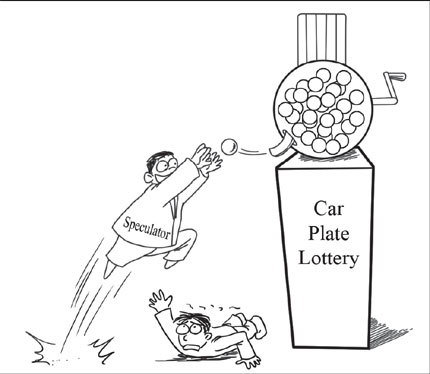Auctioning license plates far better than dodgy lottery
|
|
|
?[By Zhou Tao/Shanghai Daily] |
Economists long advocated the use of auctions to assign scarce resources. Two Nobel laureates won their prize largely for that reason.
Ronald Coase first proposed auctioning the airwave spectrum in a paper in Journal of Law and Economics in 1959, and William Vickrey later pushed auctions for many years. In fact, the second price auction format was named the Vickrey auction in honor of his historic role in promoting this efficient resource allocation mechanism.
The auction theory has been so extensively studied in the economics literature that the joke is there are more auction papers (mine included) than actual auctions happening.
In China, one auction concerns Beijing's allotment of automobile license plates. Beijing's traffic congestion problem is getting out of control, and so is the municipal government's series of brute-force measures in response.
The quota imposed since the beginning of this year is on course to mow auto sales in Beijing by more than half, killing half of the auto dealer economy worth at least 1 billion yuan (US$153.8 million) based on my calculation. Dozens of dealers will close their doors, and thousands of sales jobs will go down the drain.
And yet at the same time, the Beijing municipal government is in the process of a 14 billion yuan giveaway through its disastrous license plate lottery system.
How do I come up with this 14 billion yuan number? Just look at Shanghai.
Shanghai officially started using auctions to issue license plates in 1994. As of 2007, the accumulated proceeds from these auctions over 14 years totals close to 14 billion yuan. The bulk of the money has been spent on the subway system and the mid-ring freeway project in Shanghai. And for that, I thank each mayor of Shanghai in the last 14 years.
Granted, there are indeed complaints about the high cost of license plates in Shanghai, which goes for around 30 thousand yuan, known as the most expensive steel plate in the world. This is perfectly understandable for those footing the bill, like rich folks whining about high taxes. Yeah, too bad you have to pay!
Black market
But the fact of the matter is that rights to scarce resources would be monetized anyway, invoking the famous Coase argument, if the government uses non-market-based allocation mechanisms. Secondary and perhaps black market would creep out. Rent seekers in the know would get a windfall. Corruption would be guaranteed to happen in the process.
There are already such signs in the license plate lottery system in Beijing. In the last two months, only 20 percent of the lottery winners actually placed orders for a car, hitting the already beleaguered auto dealer industry with another blow.
My guess is that many of those who don?t need cars are now rushing to the lottery anyway, which offers fair chances of winning. Many of the winners are now scrambling to find the next car owner to flip to, someone who is really in need of a car.
In the meantime, the after-market for license plates has already been born.
An aged second-hand boxy Alto, one of the cheapest cars on earth, fetched 90,000 yuan last month. Even the price of a brand new one is only a third of that.
Guess why the sucker over-pays that much? Obviously it is because of the word òBeijingó on the license plate.
The likely 70,000 yuan difference could have gone into the coffers of the Beijing municipal government, which could have used it for the subway system and maybe the seventh ring highway.
That auction triumphs over lottery in efficiently allocating scarce resources can be attested to by the US Federal Communications Commission?s (FCC) spectrum allocation history.
In the series of spectrum lotteries conducted by the FCC in the late 1980s, more than 320,000 lottery tickets were acquired by spectrum speculators, including dentists, lawyers, accountants, and anyone else savvy enough to devote the time and hire the legal talent necessary to fill out the complicated form to acquire a lottery ticket.
Many fortunes were born out of the government?s mega billion dollar giveaway.
In December 1989, the FCC selected the winning ticket for a lottery for one license on Cape Cod, Massachusetts, which was sold 10 months later for US$41.5 million. Former Virginia Governor Mark Warner, a US Senate staffer before the lottery, was among the politically savvy who made millions by acquiring and flipping the licenses granted in the lottery.
On advice of the economists community and under congressional pressure, the FCC then switched to auction to allocate spectrum licenses in 1994, perhaps not coincidentally about the same time that Shanghai started to use auctions to allocate car licenses.
Both have created billions of dollars from thin air for the government, which are then used for good causes in the interest of the public.
Both have their share of criticism too, albeit mostly from those who eventually voted with their wallet.
These are enough reasons for the Beijing municipal government to take a lesson in free market-based resource allocation mechanisms.
 0
0 







